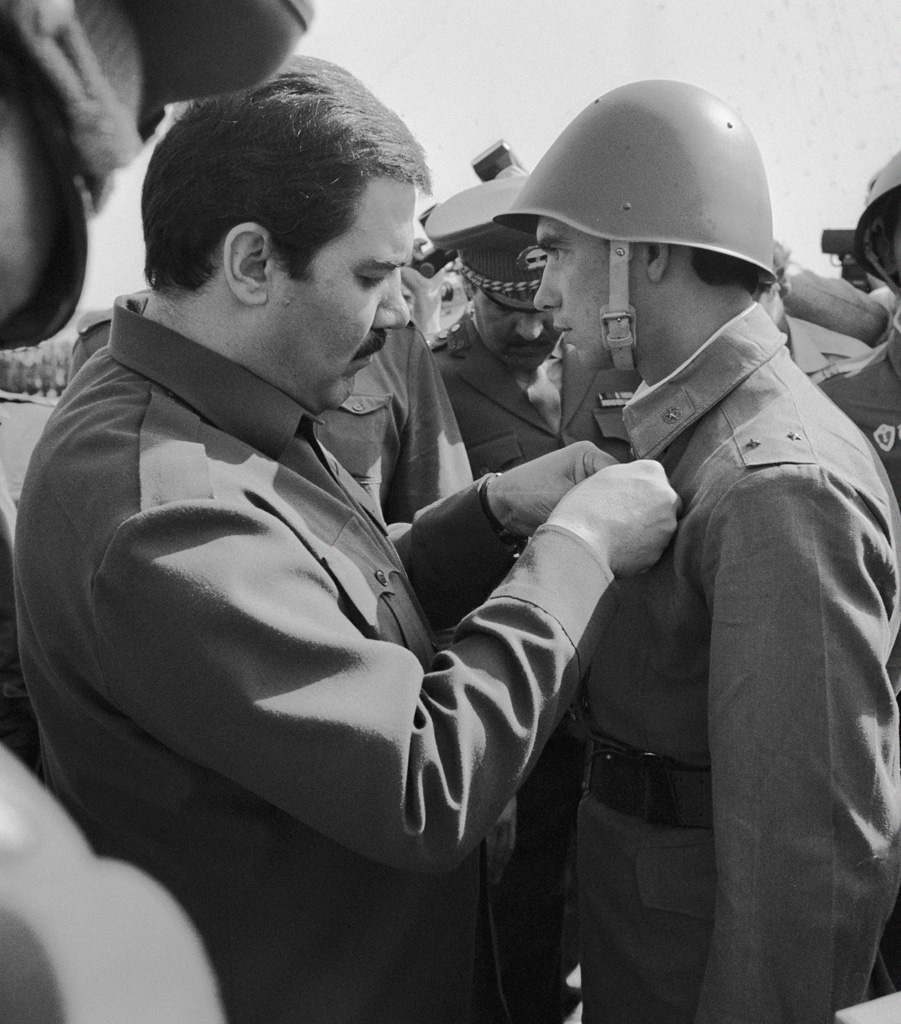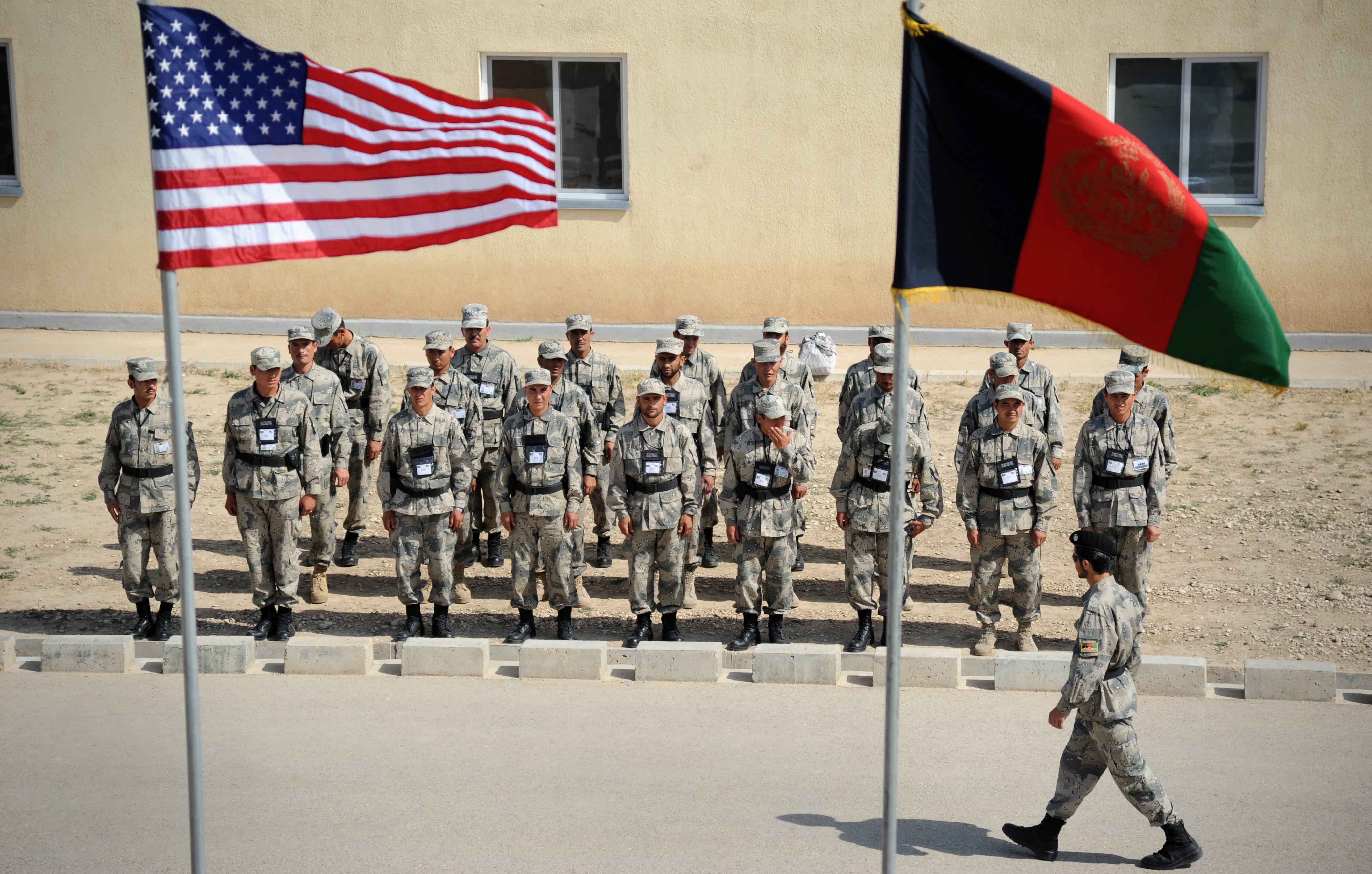|
Grohi Kar
The Kar or Gruhi Kar ( fa, گروهی کار , "Worker's Group") was a faction of the communist PDPA party in Afghanistan. At one point, Kar was one of four PDPA factions, along with the Parcham, Khalqi, and Setam-e Milli. The group was headed by Dastagir Panjsheri, who later joined the Khalq. In 1987, President Najibullah approved a plan to form four militia units from the ranks of the Gruhi Kar, to secure the group's home area of Jowzjan and Faryab Faryab (Dari: ) is one of the thirty-four provinces of Afghanistan, which is located in the north of the country bordering neighboring Turkmenistan. It has a population of about 1,109,223, which is multi-ethnic and mostly a tribal society. The pr ... Provinces. However Abdul Rashid Dostum, an Uzbek leader then serving as a DRA Army officer, intervened to block the creation of the Kar militias and ordered the arrest of Kar members (resulting in the death of one). References Factions of the People's Democratic Party of Afg ... [...More Info...] [...Related Items...] OR: [Wikipedia] [Google] [Baidu] |
People's Democratic Party Of Afghanistan
The People's Democratic Party of Afghanistan (PDPA), ''Hezb-e dimūkrātĩk-e khalq-e Afghānistān'' was a Marxist–Leninist political party in Afghanistan established on 1 January 1965. Four members of the party won seats in the 1965 Afghan parliamentary election, reduced to two seats in 1969, albeit both before parties were fully legal. For most of its existence, the party was split between the hardline ''Khalq'' and moderate ''Parcham'' factions, each of which claimed to represent the "true" PDPA. The party originally followed leftist and Marxist–Leninist ideals. Despite its orientation, the party did not describe itself as "communist", instead using labels such as " national democratic" and "socialist". In its final years, the party gradually moved away from Marxism–Leninism and towards Afghan nationalism. While a minority, the party helped Mohammed Daoud Khan, former Prime Minister of Afghanistan, overthrow King Mohammed Zahir Shah in 1973 and establish the Repu ... [...More Info...] [...Related Items...] OR: [Wikipedia] [Google] [Baidu] |
Parcham
Parcham (Pashto and prs, پرچم, ) was the name of one of the factions of the People's Democratic Party of Afghanistan, formed in 1967 following its split and led for most of its history by Babrak Karmal and Mohammed Najibullah. The basic ideology of the Parchamites was one of a gradual move towards Islamic socialism in Afghanistan. The Parcham faction supported this idea because they felt that Afghanistan was not industrialized enough to undergo a true proletarian revolution as called for in the '' Communist Manifesto''. The Parcham faction had more urban based members who belonged to the lower-middle and upper middle classes. Opposed to the more moderate Parchamis were the hardline Stalinist Khalq faction. The Khalq () developed a more vigorous line, advocating an immediate and violent overthrow of the government and an establishment of a Stalinist regime. Because of Parcham's links with the Kingdom of Afghanistan, initially wishing to keep the constitutional monarchy in ... [...More Info...] [...Related Items...] OR: [Wikipedia] [Google] [Baidu] |
Khalqi
Khalq ( ps, خلق, ) was a faction of the People's Democratic Party of Afghanistan (PDPA). Its historical ''de facto'' leaders were Nur Muhammad Taraki (1967–1979), Hafizullah Amin (1979) and Sayed Mohammad Gulabzoy (1979–1990). It was also the name of the leftist newspaper produced by the same movement. The Khalq wing was formed in 1967 after the split of the party due to bitter resentment with the rival Parcham faction which had a differing revolutionary strategy. It was made up primarily of Pashtuns from non-elite classes. Its leaders preferred a mass organization approach and advocated class struggle to overthrow the system to bring about political, economic and social changes. Their Marxism was often a vehicle for tribal resentments, and its policies eventually led to the failure of the government of the Democratic Republic of Afghanistan that was formed as a result of the Saur Revolution in 1978, including radical reforms and brutal dissident crackdowns that encouraged ... [...More Info...] [...Related Items...] OR: [Wikipedia] [Google] [Baidu] |
Setam-e Milli
Settam-e-Melli ( ps, ستم ملي, lit=National Opression) was a political movement in Afghanistan, led by Tahir Badakhshi. The organization was affiliated with the Non-Aligned Movement, and was opposed by both the Afghan monarchy and by the Soviet-aligned People's Democratic Party of Afghanistan. Its followers were mostly Persian speakers. Most of its members were non-Pashtuns—Tajik, Uzbek, and other minorities—and it has been variously described as an anti-Pashtun separatist group and as a Tajik and Uzbek separatist group.Diego Cordovez & Selig S. Harrison, ''Out of Afghanistan: The Inside Story of the Soviet Withdrawal'' (Oxford University Press, 1995), p. 34-35.Senzil Nawid, Language Policy in Afghanistan: Linguistic Diversity and National Unity, in ''Language Policy and Language Conflict in Afghanistan and Its Neighbors'' (Koninklijke Brill NV 2012), p. 42.Frank Clements, Badakhshi, Tahir (?-1979), in ''Conflict in Afghanistan: A Historical Encyclopedia'' (2003), ... [...More Info...] [...Related Items...] OR: [Wikipedia] [Google] [Baidu] |
Dastagir Panjsheri
Ghulam Dastagir Panjsheri (غلام دستگير پنجشېری) was an Afghan communist politician and public servant. Panjsheri was usually identified as a Khalq by fellow Afghan politicians, while outside observers said he was creating his own PDPA group under the name Gruhi Kar. Early career https://upload.wikimedia.org/wikipedia/commons/a/af/Ghulam_Dastagir_Panjsheri.jpg Panjsheri studied at Kabul Teachers College and was the faculty of letters at the Kabul University. After working in a journal under the name, ''Anis'' and teaching literature at the Kabul Teachers College he started working for the Ministry of Information and Culture. In 1965, he became a member of the Central Committee of the PDPA at their first congress meeting on January 1, 1965. When Babrak Karmal left the PDPA because of the power struggle between the Khalq and the Parchams, Panjsheri left the party with Karmal and the rest of his supporters, he eventually returned to his original position in the PDPA ... [...More Info...] [...Related Items...] OR: [Wikipedia] [Google] [Baidu] |
Mohammad Najibullah
Mohammad Najibullah Ahmadzai (Pashto/ prs, محمد نجیبالله احمدزی, ; 6 August 1947 – 27 September 1996), commonly known as Dr. Najib, was an Afghan politician who served as the General Secretary of the People's Democratic Party of Afghanistan, the leader of the one-party ruling Democratic Republic of Afghanistan from 1986 to 1992 and as well as the President of Afghanistan from 1987 until his resignation in April 1992, shortly after which the mujahideen took over Kabul. After a failed attempt to flee to India, Najibullah remained in Kabul. He lived in the United Nations headquarters until his assassination by the Taliban after their capture of the city. A graduate of Kabul University, Najibullah held different careers under the People's Democratic Party of Afghanistan (PDPA). Following the Saur Revolution and the establishment of the Democratic Republic of Afghanistan, Najibullah was a low profile bureaucrat. He was sent into exile as Ambassador to Iran dur ... [...More Info...] [...Related Items...] OR: [Wikipedia] [Google] [Baidu] |
Jowzjan Province
Jowzjan, sometimes spelled Jawzjan or Jozjan (Dari: ), is one of the thirty-four provinces of Afghanistan, located in the north of the country bordering neighboring Turkmenistan. The province is divided into 11 districts and contains hundreds of villages. It has a population of about 613,481, which is multi-ethnic and mostly agriculturalists. Sheberghan is the capital of Jozjan province. History The province is named after the early medieval region and principality of Juzjan. Between the early 16th century and mid-18th century, the area was ruled by the Khanate of Bukhara. It was conquered by Ahmad Shah Durrani and became part of the Durrani Empire in or about 1750, which formed to the modern state of Afghanistan. The area was untouched by the British during the three Anglo-Afghan wars that were fought in the 19th and 20th centuries. Recent history Following a series of changing allegiances and falling out with Uzbek warlord Abdul Malik Pahlawan in 1997, the Taliban withdrew from ... [...More Info...] [...Related Items...] OR: [Wikipedia] [Google] [Baidu] |
Faryab Province
Faryab (Dari: ) is one of the thirty-four provinces of Afghanistan, which is located in the north of the country bordering neighboring Turkmenistan. It has a population of about 1,109,223, which is multi-ethnic and mostly a tribal society. The province encompasses 15 Districts of Afghanistan, districts and over 1,000 villages. The capital of Faryab province is Maymana. It also borders Jowzjan Province, Sar-e Pol Province, Ghor Province and Badghis Province. History Faryab is a Persian language, Persian Toponymy, toponym meaning "lands irrigated by diversion of river water". The name Faryab takes its name from a town founded in the area by the Sassanids. It is the home town of the famed Islamic philosopher, al-Farabi (per the biographer Ibn al-Nadim). The area is part of the trans-border region of Greater Khorasan; during the British Afghanistan, colonial era, British geographers referred to the area as Afghan Turkestan. The history of settlement in Faryab is ancient and comprise ... [...More Info...] [...Related Items...] OR: [Wikipedia] [Google] [Baidu] |
Abdul Rashid Dostum
Abdul Rashid Dostum ( ; prs, عبدالرشید دوستم; Uzbek Latin: , Uzbek Cyrillic: , ; born 25 March 1954) is an Afghan exiled politician, former Marshal in the Afghan National Army, founder and leader of the political party Junbish-e Milli. Dostum was a major army commander in the communist government during the Soviet–Afghan War, and in 2001 was the key indigenous ally to US Special Forces and the CIA during the campaign to topple the Taliban government. He is one of the most powerful and notorious warlords since the beginning of the Afghan wars, known for siding with winners during different wars. Born into an ethnic Uzbek peasant family in Jawzjan Province, Dostum joined the People's Democratic Party of Afghanistan (PDPA) as a teenager before enlisting in the Afghan National Army and training as a paratrooper, serving in his native region around Sheberghan. Soon with the start of the Soviet–Afghan War, Dostum commanded a KHAD militia and eventually gained a r ... [...More Info...] [...Related Items...] OR: [Wikipedia] [Google] [Baidu] |
Democratic Republic Of Afghanistan
The Democratic Republic of Afghanistan (DRA),, renamed the Republic of Afghanistan, in 1987, was the Afghan state during the one-party rule of the People's Democratic Party of Afghanistan (PDPA) from 1978 to 1992. The PDPA came to power through the Saur Revolution, which ousted the regime of the unelected autocrat Mohammed Daoud Khan; he was succeeded by Nur Muhammad Taraki as the head of state and government on 30 April 1978. Taraki and Hafizullah Amin, the organizer of the Saur Revolution, introduced several contentious reforms during their rule, such as land and marriage reforms and an enforced policy of de-Islamization alongside the promotion of socialism. Amin also added on the reforms introduced by Khan, such as Universal access to education, universal education and Women in Afghanistan, equal rights for women. Soon after taking power, a power struggle began between the hardline ''Khalq'' faction led by Taraki and Amin, and the moderate ''Parcham'' faction led by Ba ... [...More Info...] [...Related Items...] OR: [Wikipedia] [Google] [Baidu] |


